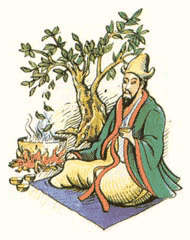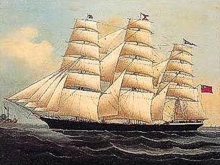History of Tea
There are many legends surrounding tea but we can be fairly certain that tea's origins date back to around 2700 BC. Tea is thought to have first been discovered by Emperor Shen Nung in the mountainous areas of China's far western Sichuan or Yunnan province. It is said he was resting beneath a tree whilst his servant prepared some water on the fire. The wind picked up and blew a leaf from the tree into the water, the Emperor decided to try the liquor, and, after drinking felt revived. The tree was a tea tree and he reputedly went on to discover the medicinal benefits of tea.

From this period onward there are many references to tea being either offered as gifts to Emperors or requested to remedy a vast array of ailments, and although originally taken as a detoxifying medicine, it soon became known for it’s digestive properties and was first recorded in the dictionary in 350 A.D. as ‘Tu’.
Tea grew to great social prominence during the Tang (620-907 AD) Dynasty. This is said to be the Golden Age of Tea and following this the Sung (960-1279 AD) Dynasty was responsible for ‘spreading fragrant tea in the nine districts’ of China.
Tea's attributed health benefits were becoming known outside of China and "tea culture" was beginning to spread. In 805 A.D. Saicho a Zen Buddhist monk returned to Japan from China with seeds of the tea plant to be planted in his monastery.
It was during the Song Dynasty 960-1279 that tea really began to thrive. This is the Second Golden Age of tea. Teahouses begin to emerge as social and spiritual gathering places. Special ceramics are made just for tea and improved agriculture techniques lead to cheaper tea prices so that even the poorest families could afford this luxury.
Tea lost its way a little during the Mogul rule (1279-1368), however thrived again during the Ming Dynasty when fermentation was discovered to produce teas ranging from Green to Oolong to Black.
It was not until 1610 that The Dutch East India Company is formed and establishes trading links with China. And by the 1700’s Britain imported more that 100,000lbs a year and Thomas Twinning opened the first Teahouse in Britain in 1717.

There have been very few changes to tea since the 1800’s, until now. The opening up of the Chinese market has meant that we are now able to discover wonderful new varieties, new flavours, new shapes and fragrances. We are no longer bound by the limited choice of tea bag tea on our supermarket shelves.
We are now free to discover tea, as it was originally meant to be.
